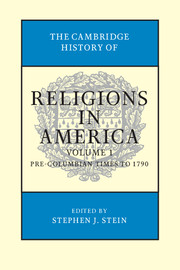Book contents
- Frontmatter
- Contents
- Contributors
- Editor's Introduction
- SECTION I BACKGROUND ON RELIGIOUS TRADITIONS – PRE-1500S
- 1 Native American Religion
- 2 Roman Catholicism circa 1500
- 3 Protestant Traditions in Western Europe on the Eve of North American Colonization
- 4 Religious Traditions in Great Britain on the Eve of Colonization
- 5 Some Notes on African Religious Traditions from the Fourteenth Century Onward
- SECTION II RELIGIONS IN THE POST-COLUMBIAN NEW WORLD – 1500–1680S
- SECTION III RELIGIOUS PATTERNS IN COLONIAL AMERICA – 1680S–1730S
- SECTION IV RELIGIOUS DIVERSITY IN BRITISH AMERICA – 1730S–1790
- SECTION V AMERICAN RELIGIONS IN THE EIGHTEENTH-CENTURY INTERNATIONAL CONTEXT
- SECTION VI THEMATIC ESSAYS
- Index
- References
3 - Protestant Traditions in Western Europe on the Eve of North American Colonization
from SECTION I - BACKGROUND ON RELIGIOUS TRADITIONS – PRE-1500S
Published online by Cambridge University Press: 28 July 2012
- Frontmatter
- Contents
- Contributors
- Editor's Introduction
- SECTION I BACKGROUND ON RELIGIOUS TRADITIONS – PRE-1500S
- 1 Native American Religion
- 2 Roman Catholicism circa 1500
- 3 Protestant Traditions in Western Europe on the Eve of North American Colonization
- 4 Religious Traditions in Great Britain on the Eve of Colonization
- 5 Some Notes on African Religious Traditions from the Fourteenth Century Onward
- SECTION II RELIGIONS IN THE POST-COLUMBIAN NEW WORLD – 1500–1680S
- SECTION III RELIGIOUS PATTERNS IN COLONIAL AMERICA – 1680S–1730S
- SECTION IV RELIGIOUS DIVERSITY IN BRITISH AMERICA – 1730S–1790
- SECTION V AMERICAN RELIGIONS IN THE EIGHTEENTH-CENTURY INTERNATIONAL CONTEXT
- SECTION VI THEMATIC ESSAYS
- Index
- References
Summary
By 1550, most Europeans believed that the Protestant Reformation would engulf the entire continent. By 1600, this was no longer a self-evident truth. The Roman Catholic Church had rallied its forces and held off the Protestant advances in Western and Central Europe and regained lost ground in the East. The Oratory of Divine Love, papal reform, the Council of Trent, the Jesuits, and the various coercive devices associated with the Index of Prohibited Books and the Roman Inquisition all contributed to Catholic renewal by the end of the sixteenth century.
By 1600, confessional loyalties had begun to harden among the various strands of the Protestant Reformation. Moreover, recent Reformation historians believe that they had detected not one Protestant reformation, but four: Lutheran, Calvinist, Anglican, and Radical. The fifth reformation of the sixteenth century is, of course, the Catholic Reformation. This essay will deal with the Protestant reformations that originated on the continent – Lutheran, Calvinist, and Radical – and their identity on the eve of the colonization of North America.
Almost all immigrants to North America in the early seventeenth century had a religious allegiance, and most were serious about their religious commitment. Those who came after them in the next century may have been less committed, but the first generation of newcomers to the American wilderness from the European continent were mostly firm believers whose religious experience reflected one of the three great Protestant traditions: Lutheran, Reformed, or Anabaptist.
- Type
- Chapter
- Information
- The Cambridge History of Religions in America , pp. 52 - 72Publisher: Cambridge University PressPrint publication year: 2000

